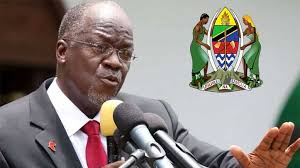PRESIDENT John Magufuli of Tanzania has added salt to injury by ordering police to take stern action against civilians who will question the integrity of the intelligence forces and police in the face of rampant abductions and killings of his critics. He gave the orders at a public rally in Zanzibar, on 11th January, on the eve of the 56th anniversary of the Zanzibar Revolution.
At a time when Tanzania and the world expected the president to assure his people that no one would be killed or abducted or persecuted in any way for criticising his government, he threatened those who will question police’s nonchalance with regard to such crimes.
Instead of putting the police force to task for failing to put an end to the arbitrary killings and abductions of civilians – mainly politicians, journalists, activists and businessmen – he gave them marching orders to deal with anyone who will run public campaigns against abductions of civilians.
Due to the obvious indifference by police, and because of some circumstantial evidence in particular incidents, the public has been associating these crimes with some rogue elements in the security forces. But the president irresponsibly said that some of those who had disappeared had not been abducted but, instead, might have gone to attend to their extramarital affairs.
His remarks echo a similar insensitive statement by Home Affairs Minister Kangi Lugola who told reporters and parliamentarians in Dodoma last year that missing journalist Azory Gwanda and others might have “gone for greener pastures elsewhere” – a statement that was subconsciously refuted by Foreign Affairs Minister Palamagamba Kabudi, when he told the BBC in London that Azory had “disappeared and died.”
Reacting to social media backlash, however, Kabudi backtracked his statement later, claiming he had been misquoted, but his previous words uttered in English were unequivocal. Some reliable sources within the security forces confided to SAUTI KUBWA that the journalist had been murdered and buried by the abductors.
Although President Magufuli claims that it is wrong for the people to associate the security forces with abductions and killings, it is obvious that his government is doing little or nothing to stop the crimes.
His speech was broadcast live by the Tanzania Broadcasting Corporation (TBC). He told the top officials of the security forces present at his rally: “We cannot have a few individuals play around with the reputation of our forces while it is only through your work that we remain safe. Walk with your heads held high; you have my total backing and approval.”
He has ordered that such people should be arrested and forced to provide evidence to the security forces.
But it is on record that his government took no action in 2018 when Mara Regional Commissioner Adam Malima confirmed to the media that the two men who had been shot during a foiled abduction of businessman Peter Zacharia were officers of the Tanzania Intelligence and Security Services (TISS).
In 2016 when a police officer threatened former Information Minister Nape Nnauye with a pistol in broad daylight, it was later revealed that the officer worked with the Presidential Security Unit (PSU). No action was taken against him.
In 2017 when singer Roma Mkatoliki was abducted and tortured, it became known after his release that he had been forcefully taken by security forces colluding with Dar es Salaam Regional Commissioner Paul Makonda. When Roma called a press conference, he was suddenly flanked by Information Minister Harrison Mwakyembe. Out of fear, Roma withheld some sensitive information.
The behaviour of the government, police and the security forces following the assassination attempt of Opposition Chief Whip Tundu Lissu in September 2017 has kept Magufuli and the security organs implicated.
It goes without saying that even the manner in which the kidnapping of Mohamed Dewji took place in 2018 leaves much to be desired regarding the integrity of the security forces.
Activist Ben Saanane was abducted in 2016 after he had questioned the authenticity of Magufuli’s PhD – which he earned part-time in three years against the university curriculum (which gives six years as a minimum duration for a part-time student).
The list of victims under the Magufuli administration is long, but recent examples include Erick Kabendera and Tito Magoti who were, on different occasions, forcefully taken by the “unknown people,” tortured in secret places for about two days as police denied any knowledge or involvement, only to confirm their “arrest” later, following a strong social media campaign and an incessant public outcry. In retaliation to the campaign and public outcry, police slapped Kabendera and Magoti with serious trumped-up criminal charges that will keep the two behind bars indefinitely.
But this is not the first time Magufuli gives such controversial orders to security organs against citizens. In December 2018, against the constitutional and legal requirements, he promised to award and promote police officers who would “shoot and kill criminals.”
Analysts say Magufuli’s latest statement gives leeway to abductors, and they consider it as yet another indication of his impulsive and authoritarian rule. In the past four years, there have been tens of mysterious disappearances of innocent civilians due to abductions and similar actions in Tanzania.
Several times, in vain, the media has sought an explanation from the police force as to why they refrain from taking any action against probable culprits. Police claim that the crimes are committed by “unknown people,” a term that has, of late, become a household nickname sarcastically associated with police and rogue elements within TISS. Angered by this trend, Magufuli came up with the offensive statement against civilians on Saturday.
It is evident that Magufuli’s regime is bent on weighing down on all forms of dissent, criticism and objective analysis ahead of the October 2020 elections.










